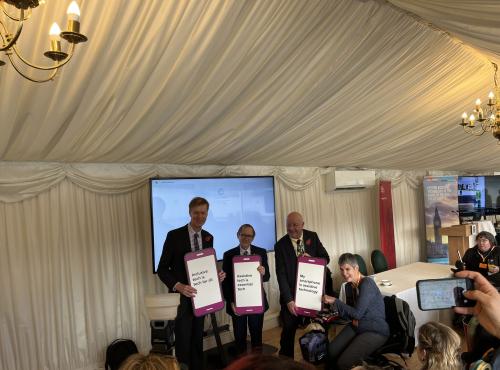Policy Connect on the Autumn Statement
Unveiling the Government’s new economic priorities in a speech on Monday, Prime Minister Rishi Sunak pledged to ‘carefully and sustainably’ reduce the tax burden. In today’s Autumn Statement, the scale of these tax cuts became clear as the Chancellor, Jeremy Hunt, introduced 110 measures in one of the final major economic events before the general election.
Having declared economic growth its ‘clear driving mission for government’, Labour will have been unsurprised to hear the Chancellor pledge to ‘turbo-charge growth’. Indeed, the Autumn Statement did little to dispel claims that Britain’s prolonged economic stagnation will be the central issue of an election in 2024.
With notable backbench concern about tax levels which are at their highest since records began 70 years ago, the Chancellor’s measures to cut National Insurance and business taxes are likely to ease concerns about further party revolt.
The Chancellor’s boldest, but perhaps most welcome, announcement was the decision to cut National Insurance rates from 12% to 10%, from 6 January. Hunt suggested that this measure would reduce the tax burden for 27 million people.
Alongside reductions to National Insurance rates, the Government introduced a £10 billion-a-year tax break for companies that invest in equipment and technology to help prime businesses for success in the 21st century economy.
The Chancellor also acknowledged the importance of British manufacturing, with the allocation of £4.5 billion for high-growth industries. In particular, the £960 million for development of a Green Industries Growth Accelerator is welcome to provide the technology, networks, and supply chains needed to achieve net zero carbon emissions by 2050.
In its latest report, Upskilling Industry, the Manufacturing Commission drew attention to the shortage of green skills within the UK’s manufacturing sector and implored the Government to use its tax and spend powers to incentivise businesses to compete in green and high-tech industries.
The increase of the National Living Wage to £11.44 is welcome, particularly as the rate now also applies to 21 and 22-year-olds. In our forthcoming report on Higher Technical Qualifications, the Skills Commission will outline the importance of encouraging young people to enter industries with labour and skills shortages. This rise to the minimum wage should help do so.
An additional £500 million to fund more AI ‘innovation centres’ is also a necessary step to ensuring the UK ‘becomes a world leader in the ethical use of data and AI’, as envisaged in our report on ‘An Ethical AI Future’.
Despite criticisms from Shadow Chancellor Rachel Reeves that the Autumn Statement did “nothing to change the Conservatives’ appalling record on the economy”, there appears little to differentiate the major party’s positions on debt, taxation, and support for businesses.
Businesses may welcome the relative consensus on Britain’s key economic priorities, yet the Autumn Statement suggests that the Government’s electoral priorities are likely to increasingly drive it towards developing and emphasising dividing lines between the Chancellor’s economic plans and those proposed by Labour.
Whilst measures to reduce the UK’s tax burden are welcome, there is danger that an impending election has led the Government to pursue premature tax cuts.



